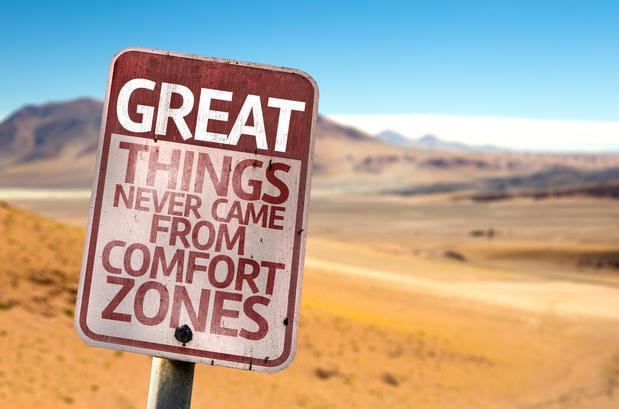by Kirk Wakefield – June 2017
What is Grit?
Angela Duckworth made an industry out of her own passion and perseverance toward a long-term goal–her definition of grit–and measuring it in others.
Controlling for other factors (SAT scores, IQ, self-control, and the Big 5 personality traits), she and her colleague’s research[ref]Duckworth, Peterson, Matthews & Kelly (2007), “Grit: Perseverance and Passion for Long-Term Goals,” Journal of Personality & Social Psychology.[/ref] found the grit items (click here to see if you have grit) to be good predictors of performance among spelling bee contestants, Ivy league students and West Point cadets. Gritty children work harder and longer, performing better in national spelling bees. Gritter students attain higher levels of education among those of the same age, but grit does appear to increase as we get older.[ref]Duckworth & Quinn (2009), “Development and Validation of the Short Grit Scale,” Journal of Personality Assessment.[/ref]Gritty cadets are more likely to complete training. Those with more grit experience fewer lifetime career changes.
The question is: Is grit a good predictor of sales performance in professional sports? In particular, accounting for popular DISC behavioral measures and factors under sales management’s control, does measuring grit offer potential help in recruiting and retention of salespeople?
The Study
Data were collected from 307 salespeople (89% < 4 years experience; 67% males; 98% with at least college degrees) and 34 managers from 18 professional teams in MLB, NBA, MLS, NFL, and NHL. Respondents provided demographics and completed measures of:
- DISC behavioral profile
- Grit
- Impression management (to account for social desirability bias)
- Adaptive selling skills
- Extent of sales training provided by the organization
- Confidence in selling skills
- Job satisfaction
- Sales performance relative to others in department (dollar sales, new packages, major accounts, exceeding targets, helping supervisor & dept hit goals)
- Selling effort relative to others in the department (hours, effort, contacts made)
Different from other studies, we collected sales performance and effort evaluations on exactly the same items (#8 & #9) from the direct supervisors of each sales representative. Each sales manager examined current sales performance (in dollars), rank ordered those in the department, and then completed the performance evaluations for the first quarter of the 2017 year. In total, we were able to match 288 responses (i.e., inside sales and account executives) with supervisor evaluations. [ref] We conducted a second study among sales staff (N = 144) across the entire East Coast Hockey League with similar results. [/ref]
The Results of Grit
The types of achievements studied by Duckworth each culminated in an event (i.e., completing college, West Point, or a Spelling Bee). A sales career is a series of continuous competitions, where standings update daily, and the conclusion uncertain. Does grit directly predict performance?
Among salespeople in professional sports, grit indirectly influences sales performance in two important ways:
- Grittier salespeople give relatively more effort than other salespeople, including hours spent selling and the total number of contacts made. In turn, effort (work ethic) drives performance in this data.
- Grittier salespeople are more satisfied with their jobs, which means lower turnover. Satisfied salespeople give more effort, which leads to higher performance.
Bottom line: Hire gritty salespeople. Use the grit scales as one input in recruiting. Mean grit score among cadets (3.75) and our study (3.82) would be a good baseline.
Grit scores at the highest levels may be a function of impression management, saying what we want to hear. But, either way, people who say they have more grit are evaluated by their managers as giving more effort. In a battery of measures, grit scores offer insight. [ref]If potential reps willingly admit having little grit (i.e., scores low on the grit scale), you should believe them.[/ref]
The Effects of DISC Behavioral Styles
This study largely confirms what we found before regarding DISC behavioral styles among salespeople, with some additional insights. Salespeople with more dominant behavioral styles (High D’s) perform better than those with low dominance traits. Why? The data shows:
- High D’s are more likely to be confident in their sales skills.
- High confidence in selling skills is a strong predictor of performance.
- High D’s are more likely to use adaptive/consultative selling.
- High C’s are less likely to use adaptive/consultative selling.
Bottom line: Use DISC behavioral profiles for recruitment and development. But, be careful: Some high SCs (low D) can be very competitive and have the ability to focus on goals. Confidence in selling skills is a much stronger predictor of performance than DISC behavioral styles. The good news is good sales training builds confidence.[ref] In other words, good salespeople are born, but you can also raise them.[/ref]
The Effect of Sales Training
Effective sales training helps salespeople know how to: (Average grade across all teams.) [ref] For measures, see: Sujan, Weitz, and Kumar (1994), “Learning Orientation, Working Smart and Effective Selling,” Journal of Marketing. [/ref]
- Interact with customers (92)
- Provide appropriate service levels (88)
- Behave with customers (92)
- Handle objections (89)
- Handle unusual problems/situations (80)
- Deal with criticism (85)
- Present specific team strengths (86)
- Highlight specific benefits (91)
[dropshadowbox align = right width = 40%] Adaptive selling skills (disagree/agree; *reverse scored):
- Each customer requires a unique approach.
- When I feel that my sales approach is not working, I can easily change to another approach.
- I like to experiment with different sales approaches.
- I am very flexible in the selling approach I use.
- I feel that most buyers can be dealt with in pretty much the same manner.*
- I don’t change my approach from one customer to another. *
- I use a set sales approach. *
- I find it difficult to change my presentation style to certain buyers.*[/dropshadowbox]
Overall, reps positively rated sales training. But, being good is not good enough. The more profound effects on sales confidence are at the highest levels: We found training needs to be excellent (90+) to help reps exude confidence. The data also shows effective sales training increases goal clarity and adaptive selling skills. The latter has a huge (statistically speaking) effect on sales confidence.
Bottom line: Focus sales training on adaptive selling skills, particularly in dealing with difficult situations with critical customers. Include the adaptive selling skills scale to your recruiting toolbox.
Do Salespeople Deceive Themselves?
In a word, yes. Nearly 70% of the sales reps rated themselves higher on the very same questions we asked managers about each one. Some by a lot. In fact, on a scale ranging from -5 (much worse than others in the department) to +5 (much better than others in the department), 55% of reps rated themselves one point higher than their managers did on all items. About one-third rated themselves two whole points or higher than their managers did.
What does this matter? The strongest effect on sales performance and sales effort by far is the margin between self-evaluation and manager evaluation. Sales confidence, DISC profiles and effort all significantly help predict the manager’s performance evaluation. None come close to the effects of being in touch with reality. Those with perceptions closest to (furthest from) their managers are the best (worst) performers.
Bottom line: If one-third of reps are clueless about their performances and more than one half widely overestimate relative performance, how well are we communicating? Given industry turnover issues, we expect more intentional and consistent one-on-one professional development and career goal setting meetings would reduce the deception gap and improve performance.
Conclusion
Grit does not have a direct effect on sales performance, but does help predict effort and job satisfaction. Effort leads to performance. Satisfaction leads to low turnover.
DISC behavioral styles offer guidance in knowing who will succeed. However, since sales confidence improves with experience and training in adaptive selling, DISC profiles should be only one factor considered in hiring.
Our view is that the DISC is better suited to teach adaptive selling and to get people in the right seats on the bus. Further, the DISC scales exhibit poor psychometric dimensions–which we are refining. If your organization would like to participate in the next round of studies with improved DISC scales, grit measures, and our impression management scales (AKA BS Meter), please contact us here.
How Managers Can Use this Research
Based on conference calls to review the research with participants, some offered comments on action plans.


Brett Zalaski, Vice President Ticket Sales & Service, and Shawn McIntosh, Senior Manager of Inside Sales, Houston Dynamo
As someone who believes in continued learning and training, we loved seeing that confidence was so closely linked to a rep’s job satisfaction.
Markets change and the people we sell to are constantly evolving. As sales managers it is critical to continue to focus on adaptive selling skills in order to keep our reps confident and happier.


Kris Dolen, Sales Manager, and Mark Johnson, Guest & Member Relations Manager, Tampa Bay Buccaneers
This research is extremely insight. We are excited to do more digging into the research and the works of Angela Duckworth. Our two biggest takeaways:
- Great questions to use for 1-on-1’s with each member of our team are to ask: “On a 1-10 scale, where 1 is the worst and 10 is the best,
- Where do you think you stand among your peers?
- Where do think your peers would rank you?
- Based on my score for you of (X), what do you need to do to get from where you are to where you want to be?”
- Understanding the DISC profiles:
- Will help me become more self-aware of the different styles among team members.
- Will help with Situational Leadership of my team, which is a great way to train & build confidence.

Rob Erwin, Director of Ticket Sales, Dallas Mavericks
This study gave our management some new concepts to consider with regards to recruiting and retaining a best in class staff. I intend to apply more questions during the interview process to discover the candidate’s measure of grit. I hope this will in turn help better predict their effort once they move past the honeymoon portion of their hiring. Separately, given the statistics on reps deceiving themselves, I will continue to evaluate how we can clearly communicate with our staff regarding their individual performances.

Geno Fata, Manager of Inside Sales, Arizona Diamondbacks
After reading “Grit” by Angela Duckworth last year, I’ve been increasingly curious as to how grit applies in a sports sales setting. My hunch was “grittier” sales reps would be more likely to succeed over their less gritty peers. It is valuable to know that in a sports sales setting, grit heavily influences both effort and job satisfaction, as those are two crucial indicators of success in our program.
We plan to use takeaways from this study in a few different ways – evaluating grit both in candidates and our current sales reps by administering the Grit Scale, and supplementing it with a few supporting questions that will either reinforce their Grit Score, or call it into question.
The study is also a great reminder of the importance of quality and on-going training, and regular perception vs. reality exercises between sales reps & managers – making sure our reps perceptions of their performances are on par with our evaluations of them.







